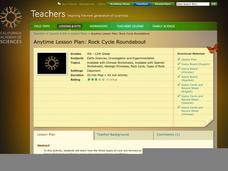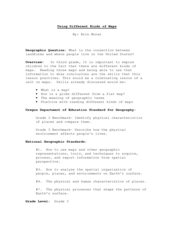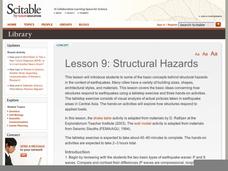Curated OER
How to Make Copperas from Pyrites
Students produce copperas from iron pyrite nodules. In this chemistry instructional activity, students determine the different applications of copperas.
Curated OER
Living in the Greenhouse
Students discuss the different types of climate zones found throughout the world. They participate in activities which relate to real events. They make observations and the consequences of their actions on the environment.
Curated OER
Evaluating an Illinois Earthquake
Students develop awareness of occurrences of earthquakes in Illinois and their past and potential future damage, and examine distribution of earthquakes in central U.S. regions.
California Academy of Science
Rock Cycle Roundabout
After a basic introduction to the rock cycle and the three main types of rocks, young geologists can deepen their understanding of how rocks change through a fun learning game. Based on the characteristics and events shared by a reader,...
Messenger Education
Look But Don’t Touch—Exploration with Remote Sensing
Mars is home to the tallest mountain in our solar system, Olympus Mons. For this set of two activities, learners review geologic land formations through the analysis of aerial maps. They then apply this knowledge to aerial maps of...
Carnegie Mellon University
Ocean Acidification
After brainstorming what they know about ocean acidification, youngsters place eggs in acid to determine the effects on calcium-containing organisms, and add carbon dioxide to solutions with sea shell material to discover the impact on pH.
Curated OER
Sequence of Events: The Watershed
Class members simulate a watershed with a painters drop cloth, placing objects underneath to create landscape variation, making "rain" with a watering can, and using red drink mix powder to track the path of precipitation. They observe...
Union County Vocational Technical Schools
Engineering Drawing
Knowing the basics of drafting allows individuals to create drawings that show all the views and measurements necessary to allow others to visualize the original object. Pupils gain experience by drawing three orthographic views of an...
Curated OER
Oil: The Problem or Solution to the World's Economic Future
Students map the major oil producing and consuming countries and regions. They identify current and future topographic and political problems that could affect the production and transportation of oil.
Curated OER
Coal Derivatives by Destructive Distillation
Chemists use the destructive distillation technique to produce three derivatives from a sample of bituminous coal. You will find background information, a materials list, procedures, and sample follow-up questions that you can use in...
Curated OER
Gliders
Young scholars design and build a small glider. They see how the flight of a bird is similar to the flight of a sailplane. They explain how birds get their thrust and how they control their direction of flight.
Curated OER
Who Wants to Carry a Million?
Students, in groups, determine the volume of a box large enough to hold a million dollars. They calculate the dimensions of a bill and the volume of the money.
Curated OER
Cylinder: Student Worksheet
In this cylinder worksheet, students compare three different cylinders to experiment which one has the greatest volume. Students interact with rectangles as they experiment with the cylinders.
Curated OER
Model Volcanoes
Students represent volcanoes with models and sketches. They research volcanoes and plan how to build a model. They, in groups, build a model volcano and cause it to erupt making observations before and after the eruption.
Curated OER
Creating Climographs
Students chart statistical information on graphs, interpret the information and use it to explain spatial relationships, and identify the relationship between climate and vegetation.
Curated OER
How Mountains Shape Climate
Students use raw data to make a climatograph; they explain the process of orographic precipitation and the concept of a rain shadow.
Curated OER
Leach Out and Touch Someone
Students discuss how groundwater becomes polluted. In groups, they design and create models of groundwater pollution sources. They demonstrate to the class how the water may become contaminated from local and nonlocal pollution sources.
Teach Engineering
Get Me Off This Planet
What do Newton's Laws have to do with getting from Earth to Mars?The activities in this resource show how Newton's Laws work with rockets to get them into space. Background information includes facts about orbits and how orbits are used...
Curated OER
Using Different Kinds of Maps
Third graders explore the landforms and population diversity. They read maps and examine geographic terms. Students create their own map of the United States and answer questions about the location of people. After exploring the map, 3rd...
Nature
Structural Hazards
The scientific explanation of seismic waves is detailed in the introduction. A fictional scenario is also provided for your class to discuss. Pictures and handouts that are meant to be included, however, they are not accessible....
Curated OER
Nature - animals in environment
Seventh graders observe and draw animals in their environment. They also examine the work of other artists. They choose one animal and create a clay model of it in its environment.
Curated OER
Styrofoam Relief Prints
Using Styrofoam trays, kindergartners carve and create their own prints. They create an image in the Styrofoam, ink it up, and then use it to create prints. It would be great to mention and show how ink blocks or block prints have been...
Curated OER
The Fabric of Our World
Middle schoolers discuss cultural diversity, and examine how the community reflects the cultural background of the inhabitants. They read the book, People, take a community walk, create a rainbow chart, and research other states for...
Curated OER
The Magic of Cranberries
Students research climatic and soil conditions for growing cranberries and illustrate how cranberries grow. They research how cranberries are used past and present and create an a-b-c book on cranberries.

























